#seven for the dwarf Lords in their halls of stone
Text
Google = Gollum

#lord of the rings#my precious#mordor#three for the elven kings under the sky#seven for the dwarf Lords in their halls of stone#Nine for mortal men doomed to die#one ring to rule them all#one ring to find them#one ring to bring them all#and in the darkness bind them#the land of mordor#gollum#smeagol#the hobbit#middle earth#the one ring#one ring#ring of power#the fellowship of the ring#the two towers#the return of the king
9 notes
·
View notes
Text





Three Rings for the elvenkings under the sky.
Seven for the dwarf lords in their halls of stone.
Nine for mortal men doomed to die.
#lotr#lord of the rings#lotredit#elves#4k#galadriel#cirdan#gil galad#rings of power#dwarves#men#witch king of angmar#villya#narya#nenya
223 notes
·
View notes
Text
the impala, 4:00 p.m. — sam winchester



cw : gn!winchester!reader, fluff, hurt/comfort, sam & reader are twins, dean's implied to be dead/gone (you choose which time lol), unedited, 608 words. requested ! for my 800 followers event [ closed ] .
summary : sam lifts your mood with a book on a sort of somber day in the impala.

for months now, it’s just been you two. sort of like how it was when sam was at stanford. you moved near campus to be close to him at nineteen. the year apart beforehand had been hellish sometimes.
but these days have this odd liminality to them. there are no crappy college kid apartments or girlfriends or parties. just the impala, the road, monsters, and each other. you miss dean. some days you almost don’t.
lots of days you miss what you and sam could’ve had, but it feels too late now. it’s sort of nice, though, because you don’t hunt all the time. you and sam take breaks. you help where you can, then you visit southern california for a taste of hot weather and salty air. last week, you stopped for a few days in a midwestern national park. it was stunning, and perfectly suited to yours and sam’s tastes.
today is an in between day, no plans and no hunts on the horizon yet. you’re behind the wheel, your mixtape playing through the speakers. as for the way you feel, everything there is an in between too.
you’re tired, but painfully aware. mourning, and oddly at peace. it doesn’t quite feel bad, but you don’t feel good.
oftentimes, your mood aligns with sam’s. you guess it could be that cliche twine telepathy, but to you it feels more like a deep understanding of each other paired with so many sort of insane and mundane shared experiences.
but today, sam is good. he’s not great, because it’s sort of hard to be more often than not these days, but the two of you are slowly figuring it out. sam very easily senses the way you feel. today and every day. he thinks you’re teetering on the edge enough that he can steer you in the more pleasant direction.
he’s going to offer to switch to the drivers seat in a bit, but he’ll do a few other things first. before interrupting your quiet time with the music and scenery, he’s going to find a good place to eat. not an american diner, but somwhere with better food. he hopes he can find a thai place with good reviews.
then he pulls out a book. you don’t look over at the movement at first. you can see the book in his lap through your peripheral vision, and don’t blink because he’s always reading when he get’s bored in his passenger’s seat. but then he turns down the music and shows you the cover with an unspoken question.
the fellowship of the rings.
you had forgotten that sam carries the lord of the rings books around with him. it catches you by complete surprise, the sight of the worn copy you two shared as kids and the question in his eyes. you grin. he’s asking if you want him to read it aloud to you, to fill up a bit of the gaping hole in this car.
“i forgot you had that,” you say, eyes turning back to the road, but your smile sticking around. sam grins back at you.
“what, you think i go anywhere without a copy of this?” he says lightheartedly, half teasing himself by saying something so nerdy.
“as you should,” you shrug, shutting the music all the way off. “go on, then.” you hear the creak of the spine, and the rustle of pages. then sam’s voice, a sound that melds in perfect familiarity with the rumble of the impala.
“three rings for the elven-kings under the sky, seven for the dwarf-lords in their halls of stone, nine for mortal men doomed to die…”
#supernatural#supernatural fanfiction#sam winchester x sibling!reader#sam winchester x gn!reader#sam winchester x reader#sam winchester fanfiction#sam winchester#supernatural angst#supernatural fluff#sam winchester x sister!reader#supernatural hurt/comfort#sam winchester x platonic!reader#sam winchester angst#sam winchester fluff#sam winchester hurt/comfort#spn fanfic#spn dean#spn sam#supernatural sam
70 notes
·
View notes
Text
"Last Temptation"
youtube
After episode 4 and the possible flash-forward, I just need to talk about this soundtrack. We haven't heard it in the show yet, and I'm pretty sure we're going to have to wait until the season finale. Bear McCreary is a master at combining leitmotifs to musically represent a scene, and I truly believe that this is the track that will play during the inevitable confrontation between Sauron and Galadriel.
Spoilers ahead for potential predictions, because I'm breaking this fucker down.
We start out with a soft soprano humming the melody of "Where The Shadows Lie". For those who don't remember the full version from the first season, it's the one with lyrics:
Three rings for the Elven kings under the sky
Seven for the dwarf lords in their halls of stone
Nine for mortal men doomed to die
One for the dark lord on his dark throne
In the land of Mordor where the shadows lie
One ring to rule them all, one ring to find them
One ring to bring them all, and in the darkness bind them
In the land of Mordor where the shadows lie
So far, we've already heard this melody quite a bit, since it's often played when something sinister and ring-related is going on. It also plays with a full symphonic orchestra during the Annatar reveal in he soundtrack called "Emissary at the Forge", which I'd personally say is actually Annatar's theme. I could go on a rant with that one to, but to put it briefly: We've got "Sauron" and "Where The Shadows Lie" played on Elven-coded instruments. Does it get more Annatar than that?
Okay. So. The scene opens with dark ring shenanigans and/or Annatar. It's dark. It has tension. It's the eerie calm before the storm.
At 0:40, the mood changes. We get strings, followed by male choir and sharp brass, leading us straight into Sauron's theme. It's not as chaotic as "Sauron" from season 1. We have a steady 4/4 rhythm compared to the whatever the hell is going on in the original theme. The core melody and the ostinato on the strings are unmistakable though. We're dealing with Sauron.
1:05 is where things start to escalate. We move between sharp female vocals and softer orchestral interludes that almost seem to fight each other, leading up to the magnificent 1:36. Galadriel's leitmotif on brass, with a note lowered just a half step to give it dissonance. If "Emissary At The Forge" is Elven-coded "Sauron", then this is Sauron-coded "Galadriel". It's not ethereal. It's not harmonic. It's intense, and I can't wait to see what Galadriel is actually doing here during this part. Fighting, most likely. Viciously.
After a brief breather, we reach 1:59 where Sauron's leitmotif returns, sung by a single soprano. No string ostinato. Just the main melody, performed with the same eerie vibe as "Where The Shadows Lie" in the intro. The orchestra builds, losing some dissonance as more instrument joins... and then we're suddenly back in a much more triumphant version of Galadriel's theme at 2:25. Something has shifted here. The dynamics are different. Maybe she's getting the upper hand? But here comes the kicker, Sauron's ace up his sleeve: Halbrand's theme.
A soft whisper of a dulcimer breaks free from the symphonic orchestra at 2:30, followed by a Nordic nyckelharpa at 2:35. There are hints of Halbrand's theme in other season 2 tracks too, but not like this. We're not just dealing with elements of Halbrand's theme here. This is Halbrand's theme, with the original instrumentalization. In episode 4, we catch a glimpse of Sauron in a flickering montage of images, looking almost exactly like he did during the battle in the Southlands. I strongly suspect that when we get to that scene, it's going to be backed up by this exact part of the soundtrack. It lasts for almost half a minute. The battle has been put on pause. Has Galadriel's feelings for the man she thought she knew caught up with her? Something emotional is happening here. Something that involves their time together, back when they were still allies.
At 2:56, the battle is on again. The sharp female choir is back, sounding even more erratic. More urgent. Galadriel's leitmotif returns, now with the right note but at doubled speed. She's retaliating.
The next major point happens at 3:47, where things suddenly go quiet. We shift into Sauron's leitmotif on soprano again, which transitions into Galadriel's, and then back to Sauron's. It's really, really smooth, and I can only applaud Bear for the execution. The themes should be incompatible, but nope, he makes it work.
At 4:53, something really interesting happens. Both "Sauron" and "Galadriel" have string ostinatos. Ostinatos are short, reoccurring melodies, and Bear often use them to back up the "main" motifs. At this time stamp, we're hearing a new ostinato that sounds an awful lot like Sauron's and Galadriel's combined. It's not as dissonant as Sauron's, but it's not as clean as Galadriel's either. I can still hear both in it, though. We're no longer just shifting back and forth between the soundtracks - they've actually merged. I have no clue what that means but I can't wait to find out. Is this her "Last Temptation"? Did he give her the same proposal again? Is she tempted?
The music builds again. At 5:27, we hear a short, explosive burst of Galadriel's theme on brass baked into an epic soundscape. Whatever it was that just happened, she's snapped out of it. She faced her temptation and turned it down. We hear the direct result of this at 5:39, where we get Sauron's theme sounding a lot more like the one from season 1 again. No more soft soprano. We're back to male choir. (I think it's worth mentioning that traditionally, male choir more evil-coded than female, so that's neat.)
If there was ever any doubt whether or not she resisted the temptation, we get a confirmation at 6:03. Galadriel's theme on harp, backed up by a soft female choir. She chose the light. Again.
The final half minute is orchestral, but the battle is over. There's peace. A touch of triumph, a touch of melancholy, but there's definitely peace.
Okay. I think I'm done. Bear is a genius so I'm sure there are even more easter eggs in there, but these are the ones I caught.
EDIT: During that final half minute, we actually get a bit of Elrond's theme. Is he the one who interrupts the altercation? Is that how the fight comes to an end? I'm really interested in seeing how that plays out.
TLDR: Bear created a Sauron/Galadriel/Halbrand medley and I'm in awe.
#haladriel#saurondriel#trop#rings of power#music#rop season 2#rop season 2 spoilers#bear mccreary#last temptation#music analysis#Youtube
60 notes
·
View notes
Photo
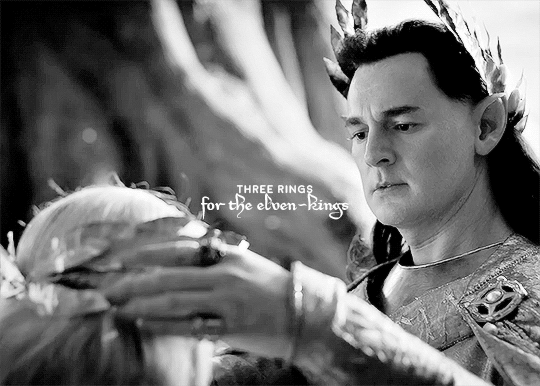

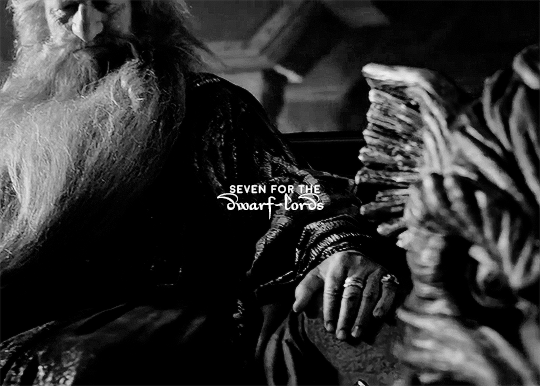
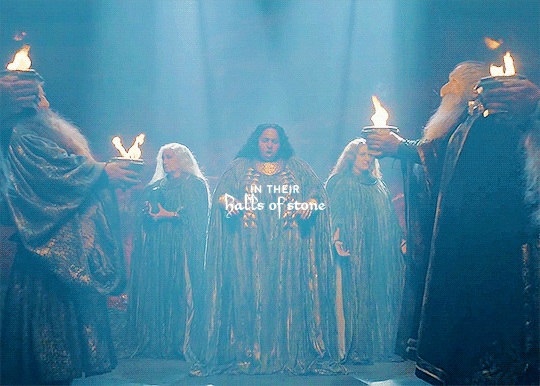
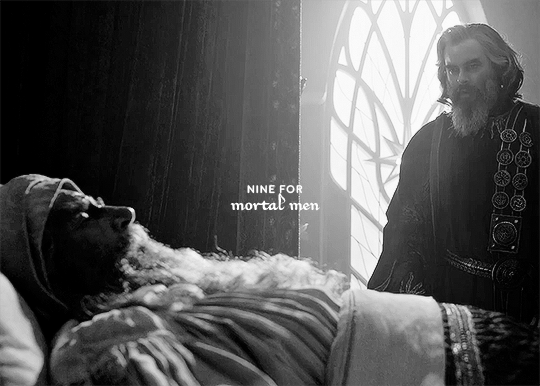
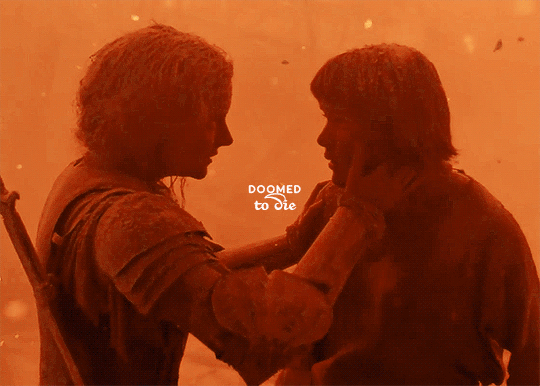
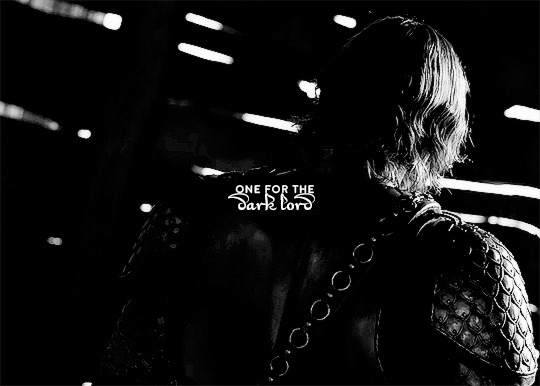
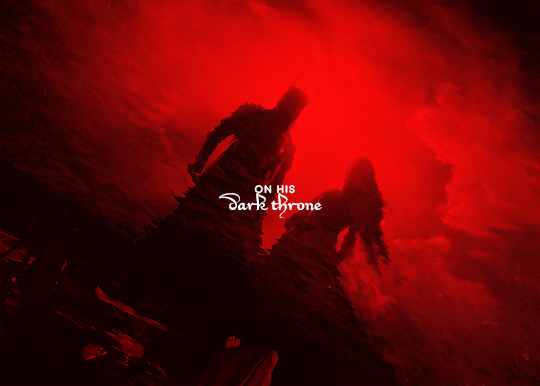
Three Rings for the Elven-kings under the sky,
Seven for the Dwarf-lords in their halls of stone,
Nine for Mortal Men doomed to die,
One for the Dark Lord on his dark throne
In the Land of Mordor where the Shadows lie.
#lotredit#ropedit#tropedit#the rings of power#rings of power#rop spoilers#trop spoilers#tolkienedit#tolkiensource#fantasyedit#gil galad#galadriel#durin iii#disa#pharazon#tar palantir#theo#sauron#tolkien quote#lore#rop s1#rop 1x01#rop 1x04#rop 1x05#rop 1x06#rop 1x07#rop 1x08#*#1k
1K notes
·
View notes
Text
Persian translation of the Ring Poem by J. R. R. Tolkien (by me)
Here is my take at translating the Ring Poem from english to persian, hope it will arouse your interest !
If you are interested by the process and my notes, it will be below it all.
English
Three Rings for the Elven-kings under the sky,
Seven for the Dwarf-lords in their halls of stone,
Nine for Mortal Men doomed to die,
One for the Dark Lord on his dark throne
In the Land of Mordor where the Shadows lie.
One Ring to rule them all. One Ring to find them,
One Ring to bring them all and in the darkness bind them
In the Land of Mordor where the Shadows lie.
Persian
سه حَلقه واسهٔ پادیشاه الفی تَحت آسمان،
هفت واسهٔ اربابهای دورفی توی اُتاق سنگ،
نه واسهٔ انسانهای فانی محکوم به مرگ،
یک واسهٔ ارباب تاریک بر سریر تاریکش،
در استان موردور کجا سایها میخزند.
یک حلقه واسهٔ حکم راندنِ برهمه. یک حلقه یافتنشان،
یک حلقه واسهٔ آوردنِ برهمه و توی تاریک پیوستنشان
در استان موردور کجا سایها میخزند.
Transliteration in latin script
se halqe vâse-ye pâdishâh-e elfi taht-e âsemân,
haft vâse-ye arbâbhâ-ye dvarfi tu-ye otâq-e sang,
noh vâse-ye ensânhâ-ye fâni mahkum be marg,
yek vâse-ye arbâb-e târik bar sarir-e târikesh,
dar estân-e mordor kojâ sâyehâ mikhazand.
yek halqe vâse-ye hakam rândan-e barhame. yek halqe yâftaneshân,
yek halqe vâse-ye âvardan-e barhame o tu-ye târik peyvastaneshân
dar estân-e mordor kojâ sâyehâ mikhazand.
I hope you will like it :) if you like the topic, you can keep reading
My process and few interesting notes
Of rhymes, rhythm, and word choice
As it can be seen, I managed to make the second quatrain have quite perfect enclosed rhymes ! A thing I could not successfully replicate in the first one… or could I ?
The first and forth verse are the problem — although both 3 syllables, and cretics as per my prononciation (kept the second e in esemân specifically for that effect) ; so quite rhythmically pleasant. But it was too close to perfection to let it pass. Even if the idea of the only two words not rhyming being the sky of the Elves and the darkness of Sauron’s throne was dramatically fortunate, even quite brilliant. But it was not by my doing, only chance’s ; so it was important to me to add brilliance intentionally, by making it rhyme all the way.
My first idea was to change the word for dark, تاریکش (târikesh) into ویران (virân), making it then :
se halqe vâse-ye pâdishâh-e elfi taht-e âs(e)mân,
haft vâse-ye arbâbhâ-ye dvarfi tu-ye otâq-e sang,
noh vâse-ye ensânhâ-ye fâni mahkum be marg,
yek vâse-ye arbâb-e târik bar sarir-e virân,
It was a fine solution, but that had problems still.
Firstly, the -esh in تاریکش (târikesh) is the possessive suffix, part of the bigger nominal group سریر تاریکش (sarir-e târikesh), meaning “his dark throne” (lit. throne dark his) ; hence the -esh. If I was to use the word ویران (virân), that possession was no more, making it mean “the dark throne”, which was okay-ish (ahah, get it?), but not literal.
Furthermore, ویران (virân) means more “desolate”, “ruined” than “dark” ; it could mean something, like a “dark world”, but it wasn’t literally because it was dark. But desolate was fine ! Mordor is quite it, given how it’s described.
Note how I wrote this time âsemân with parentheses, âs(e)mân, pronounced then âsmân — both are equally said — to match the metric of virân. A nice touch, but no possession.
I wanted the possession.
My second idea was to change the word for sky, آسمان (âsemân) into عرش (‘arsh), making it then :
se halqe vâse-ye pâdishâh-e elfi taht-e ‘arsh,
haft vâse-ye arbâbhâ-ye dvarfi tu-ye otâq-e sang,
noh vâse-ye ensânhâ-ye fâni mahkum be marg,
yek vâse-ye arbâb-e târik bar sarir-e târikesh,
As easily guessed, it had problems.
The first problem was both one… and a genius play on words. For عرش (‘arsh) means sky but in a metaphorical manner, think throne of God type of sky meaning. Which was a problem, and a miracle. Alluding to earthly religions is always risky for translations, in my opinion ; too much connotation, interfering with the translation itself. But, at the same time, it was fun. The parallel between the “throne” of the Elves (or maybe Eru Ilúvatar’s one ?) and the throne of Sauron. Good vs evil is always neat, especially when speaking of Tolkien !
Another issue was the fact that the rhymes were poorer than before, rhymes still, but poor.
A good point was the fact that we kept the possession. Important point, of course.
Of my process and sources
This part will be quick, I promise.
I mostly used Glosbe, not that much for words (well, I used it to find عرش (‘arsh) or ویران (virân), to be fair) but more to have access to its corpuses, diving into the open subtitles of the Lord of the Rings movies. I didn’t want to copy-paste the already made translations, but I used it up has a way to see how they prism through they translated english. It was interesting. Used the french ones, too.
Yes, because last of all, persian in not my mother tongue, neither is english. French is, so excuse my “frenchism” if it occurs.
If you are a persian speaker, any notes or thoughts are more than welcome ! Please, enlighten me. Know that I tried my best and do as best I could, given my knowledge, my guts, and my sources.
#lotr#writing#my writing#farsi#persian#فارسی#tolkien#silmarillion#lord of the rings#the rings of power#rings of power#translation#translated literature#translated fiction#translated poetry#linguistics#language#art#poetry#books#iran#ارباب حلقه#fantasy#high fantasy#dark fantasy
40 notes
·
View notes
Text
‘The Lord of the RIngs: The Rings of Power’ Season 2, Episode 5 (‘Halls of Stone’) Soundtrack Albums Details

1. Seven for the Dwarf-lords (4:47)
2. Unveiling the Doors of Durin (3:16)
3. Gazing to Eressëa (5:35)
4. Gil-galad’s Vision (2:12)
5. Disa in the Depths (4:35)
6. Mirdania Emerges (3:33)
7. Assault on the Faithful (feat. Clydene Jackson) (4:42)
8. Deceit in the Craft (9:05)
9. Sauron’s Design (2:26)
24 notes
·
View notes
Text




The Rings of Power
Three Rings for the Elven-kings under the sky
Seven for the Dwarf-lords in their halls of stone
Nine for Mortal Men doomed to die
One for the Dark Lord on his dark throne
In the Land of Mordor where the Shadows lie
21 notes
·
View notes
Text
Wandering Friendship Simulator 2023
Hey, rpg tumblr, I think you might enjoy The One Ring.
Some stuff that it does:
-Adventurers aren't mercenaries, they're either brave and meddlesome or Really Going Through It
-Your adventuring party specifically has a stat for how off the hook it is, Men Of Bree increase this stat
-As part of character creation, everyone picks a home base
-As part of character creation, everyone picks another PC as a bestie and becomes Shadowed if their bestie gets hurt
-There's a corruption mechanic, getting Shadowed, but you reduce it by taking a break and gardening for a few years
-There's a robust downtime system where everyone goes home after an adventure and then you all meet up like ten years later with full beards and prizes in Regional Avocado Growing and whatnot
-Combat and Walking Too Hard both deal damage, and traveling matters as much as fights
-The dice are genuinely easy to understand, and you have lots of ways to tilt the odds on a roll. You're not held hostage to your own luck
-The art's gorgeous. Really needlessly pretty. This would be a coffee table book if it wasn't also such an unfairly well made game
In conclusion, I just read it and it was supposed to be a gift for a friend, but now I'm apparently buying them a second copy.
(This game feels like a fever dream. I was expecting to snooze through it and instead my brain is alive with Game Design.)
#lotr#ttrpg#ttrpg homebrew#ttrpgs#ttrpg design#indie ttrpgs#rpg#tabletop#dnd#tolkein#middle earth#lord of the rings
138 notes
·
View notes
Text
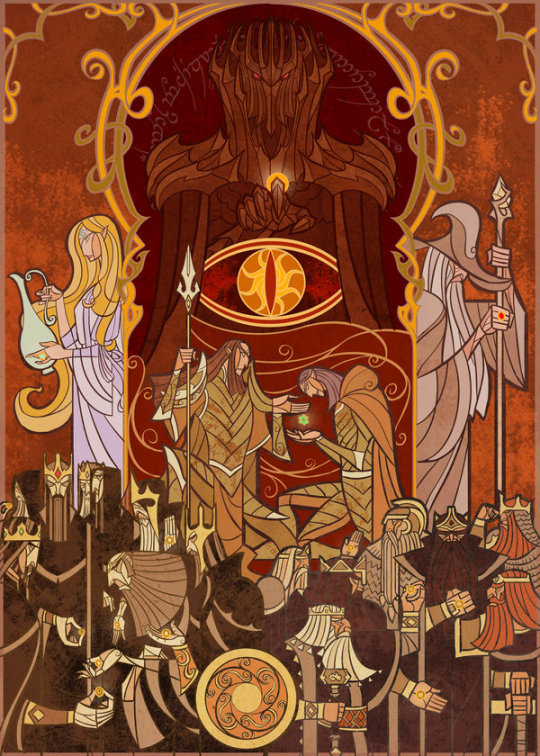
The Ring - by Breathing 2004
Hobbit: Battle of the Five Armies
Sauron: Three rings for the Elven-kings under the Sky. Seven for the Dwarf-lords in the halls of stone.
Galadriel: Nine for mortal men doomed to die.
Lord of the Rings: The Fellowship of the Ring
Galadriel: One Ring to rule them all.
Gandalf to Frodo: One Ring to rule them all, One Ring to find them all, One Ring to bring them all and in the darkness bind them.
One for the Dark Lord on his dark throne.
#tolkien legendarium#middle earth#jrr tolkien#the lord of the rings#the silmarillion#dark lord#sauron the deceiver#the nine rings#gandalf#galadriel#the hobbit#the fellowship of the ring
25 notes
·
View notes
Text





Three Rings for the Elven-kings under the sky,
Seven for the Dwarf-lords in their halls of stone,
Nine for Mortal Men doomed to die,
One for the Dark Lord on his dark throne
~ Am I using this Tumblr correctly? I have no idea.
#celebrimbor#Narvi is a twink dwarf#Witch-king is a former Numenorean and they all are dark skinned and beach people#Sauron is also a twink#LyraGoth
17 notes
·
View notes
Text
In today's Morrowind "you didn't connect sh@$" tinfoil hattery
"Three Rings for the Elven-kings under the sky,
(The Tribunal)
Seven for the Dwarf-lords in their halls of stone,
(The Ash-vampires' strongholds are mostly Dwemer ruins)
Nine for Mortal Men doomed to die,
(Nine Divines)
One for the Dark Lord on his dark throne
(Dagoth Ur literally got a ring on him)
Me to me right now:
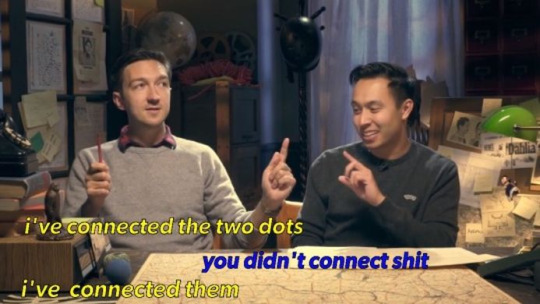
68 notes
·
View notes
Text
Analysis of Ring-Verse
I’ve been thinking about the Ring-verse, which opens most copies of Lord of the Rings, and I can’t stress how MUCH of a good opening it is.
Again, it runs thus:
“Three Rings for the Elven-kings under the sky,
Seven for the Dwarf-lords in their halls of stone,
Nine for Mortal Men doomed to die,
One for the Dark Lord on his Dark Throne
In the Land of Mordor where the Shadows lie.
One Ring to rule them all, One Ring to find them,
One Ring to bring them all, and in the darkness bind them
In the Land of Mordor where the shadows lie.”
It sets a perfect tone for the book and for many of its central themes. Chief among these is the sense of the darkness (which the rest of the book seeks to contrast with light), an overpowering force, one which is in many ways greater than the forces of light. And in the context of it being a sequel to the Hobbit, where the ring there was nothing more than a neat treasure, it adds importance and seriousness to the fantasy (a thing Tolkien has personally noted many scholars don’t do in their approach to reading what might be called “mere” “fairy-stories”). It feels like stumbling into a vast conflict with background, and it instills peril and gravitas.
I find it interesting how it provides characterization for the fantastical races of his world. The numbers of the rings themselves displaying the amount of magic, power, and enchantment lies with each of the races. Elves are named first (which sidenote funnily enough follows his cosmological order for when each race woke up before or after the others) and only need 3 Rings of Power to strive for magic they have and still do possess; the Dwarves need 7 Rings, a greater number for perhaps a less magically “graceful” group; and the most rings, 9, is given to Men, because they for the most part approach our current age, being mostly unmagical. The beauty of Men is not one that has passed out of this world, like it has gone with Elves and even Dwarves; needing more Rings to equal the same strength, and showing how that power is more further divided than the others displays how it is in some degree a lesser, non-magical existence that we live in reality (an almost encroachment of reality within the fantastical, at least so far as it is a remnant of what in his cosmology leads us to today’s age). Anyways, they’re characterized in more than just hierarchy; the ending part of each displays their aspects and to a degree the themes that go with them. Elves are “under the sky”, in the open air amongst that all-important thing to Tolkien: nature. Them being “under” it also suggests the nature elves to be tied to the circles of the world. Dwarves are also located in “halls of stone”; this shows their craftiwork, their striving for grandeur and home in great works of statue and construction. For Men, they are “doomed to die”, which is a peak into Tolkien’s philosophy that a story dealing with men by its nature deals with mortality; and it’s a concept he explores further in Lord of the Rings.
It’s also partly important to look at Tolkien’s theories on fantasy, specifically one idea, in which fantasy and the use of monsters as enemies rather than other men brings a story to a higher, more glorious display of human light fighting darkness. Its monsters aren’t just ideas or wholly symbolical, but also real and incarnate, a higher ambition for what can be fought. And in this verse, Tolkien introduces the origin of and the incarnation of all darkness and high evil; he makes it incarnate with a name, Mordor. It’s where “the Shadows lie”, capital S, the evil that lurks within and outside of people becoming one incarnate, the Enemy, the Foe.
The definition of who this evil is is also interesting, the lord of the dark, the “Dark Lord” with his “Dark Throne” who make One Ring. One because that is as much room that power and selfishness will allow, and because to Tolkien, darkness is more powerful than light even if the latter is more good; “history is but a long defeat” as he says. This evil seeks to control every other (every other ring), “rule them all”, and it has a terror to pursue one (it does not wait, but grows should one live through the world as static and inactive against it) to “find them” to get its hands on power however necessary. Then, the ultimate goal of all evil hearts, domination of all, “bring them”, “bind them”. The repetition of “One Ring” puts stress on it obviously, yet as each step is a progression in the plans of evil, it feels as though the peril grows in each. Whoever ends up controlling the Ring, will give themselves up wholly to evil ends, and whoever stands in their way will be made to suffer too before the end. And the other repeated word makes clear that what stands against them is “all”, everyone and everything. This is the destruction that will be brought on earth and people utterly in the success of the Ring. The final repetition, of “In the Land of Mordor, where the Shadows lie”, shows in some sense a sorrow and contempt for the gravity that this origin of evil made physical has unleashed upon the world. A darkness growing in the poem as much as it will be seen to be growing in the world through the reading of the story. Despair, that later in the story, the miraculous hope that’s held on to seems noble to fight against.
One last element to talk about is its place within the world he created. It reads in rhyme to balance the rhythm of what is given stress, as could be useful in lore, as it is a rhyme meant for memory of the history of the Rings by the Elves. This can be guessed at, as a warning of sorts by some inhabitant of the world for first time viewers. And the fact that the One Ring part is a quote from the inscription on the ring itself, places it further as a poem residing in Tolkien’s created world. The One Ring part shows Sauron’s intent for evil with the ring…
this also gives a commentary on language later. These words are through the enchantment of magic given power over the rest of the power structures within the world of Middle-Earth at the genesis of the Rings in the Second Age. Language has power, and as the inscription isn’t in English but in Sauron’s Black Speech created by him and him alone, we see how this power put in the hands of a unitary figure (who has room for only One, themself) erases the beauty of history and of living goodness that can reside in their meanings and diversity.
So… from this one short verse, it introduces themes of nature, mortality vs. immortality, ordinary light vs. overpowering darkness; as well as vital concepts outside the work, such as language, the importance and effect of fantasy. As well as introducing the reader to the rules of his world and the plot to unfold, and setting tone.
12 notes
·
View notes
Note
Please do gimleaf kiss 48: out of habit. Thank you!
Certainly, anon, thank you for asking! Prompt taken from this; anyone can feel free to send other numbers in at any time, I don’t care how long it’s been. (Just maybe add some context to your ask if it’s been like a month or more since I posted this, because otherwise I won’t know what to do with the random number in my inbox lmao).
The Men of Gondor are careful, cautious people; Gimli cannot blame them for it. They have lived alongside the threat of Mordor for a very long time, and their history is stained with the losses they have suffered to the dread powers of that land. Of course they have learned caution; of course they have learned care.
Gimli respects them for it and more than than, he understands them; for dwarves are careful and cautious too, keeping their own secrets close and allowing change into their hearts and caves only slowly; only once they are certain that they do not let danger in alongside. (And if Gimli chafes at some of that sluggishness these days, well, that is not the fault of the Men of Gondor.) They are right to be cautious, these Men of Gondor...
But they need not be so cautious about this.
"I assure you," Gimli says, not for the first time, "my people know their work well, my good lord." He cannot remember the name of this particular counselor; without proper beards by which to distinguish their lined, thin faces, too many of these Men look far too alike to his dwarven eyes. He has found that simple politeness can usually cover for his lack of recognition, however, and if ever it does not—well, he would like to challenge the Men in front of him to name and identify each dwarf that he has brought with him from Erebor to work their pale white stone.
He suspects they would do an even worse job of it.
"Your gates will stand a thousand years or longer when my people are done with them, and it would take an army twice as large as that which assailed your city three years ago to so much as crack their surface," he tells them. "No one builds doors like the dwarves."
"That is all well and good, Lord Gimli," says another one of these half-bearded, grave-faced Men. "But we need doors that will open, too, not just shut and stay that way. Perhaps dwarven arms would not balk at such a weight as that which your plans show," he says, glancing pointedly at Gimli's strong arms in a way that Gimli thinks is somehow meant to make him feel guilty or ashamed, "but Men are not so endowed, I fear. We—"
"Your pardon," Gimli says, holding up a hand in apologetic interruption. "A moment, if you please."
The flicker of gold and green that Gimli saw out of the corner of his eye resolves into a blur of movement swinging in through the wide window and, as the Council of Builders start and stare, Legolas trots over to their wide table as casually as though he has entered by the door at the far end of the hall and not via a window seven floors above the ground.
"Greetings, my friend," Gimli says, smiling warmly at the nimble elf. "Your meeting with the Healers has gone well, then, I hope?"
"Quite well, thank you Gimli," Legolas says, inclining his head in a regal bow to the slack-jawed Men. "Their garden of medicinal herbs will soon be flourishing, I do not doubt! But I do not mean to interrupt your own discussion..."
"Then have a seat, and we shall get back to it." Gimli pats the bench beside him—the Men sit in chairs, well-carved things of wood and age, but Gimli's shorter stature was ill-suited to the furnishing that filled this conference room; this tall workman's bench raises him to a more comfortable height against their table, and the small stool beside it makes climbing up and down easy on his thick legs—and Legolas folds himself gracefully down upon it, his own legs long enough that the toes of his soft shoes still brush the white stone floor.
"Now," Gimli says, smiling at the flustered Men (they will have to get used to elves eventually, he thinks, his mental voice smug; they have had three years to adapt to what took him mere months!), "where were we?"
"The...the weight of the gate, Lord Gimli," another Man says, picking up the thread when his companion merely gapes back and forth between the elf and the window. "It is too much; you must design something lighter."
Gimli shakes his head. "There is no need. The stone from which the gates will be hewn will be heavy, yes; but the hinges will be weighted so perfectly that they will be able to be opened with barely any effort at all. Why, a child might open these gates, if he had a sturdy friend to stand beside him!" Gimli reaches for the plans and draws his finger down the section that shows the proposed hinge-design (both functional and elegant, of course, as the Gates of Minas Tirith deserve!). "You see?" He looks up, waiting for the glimmer of recognition to fill the eyes of his audience. "They will be lighter to open than your old ones were, I promise you!"
"Lord Gimli, it is not that we do not believe you," a different Man says, in the tone that Gimli has learned means precisely the opposite. "It is only that we worry for the people of the city..."
"You need not worry," Legolas assures him blithely. "Dwarves are masters of stone to surpass all others, and Gimli would die before he spoke false word. Your gates will be marvels by the time he and his people are done with them!"
Gimli feels his cheeks flush a little at this earnest (and accurate) praise, but the Men of of the Council of Builders seem to be even less keen on the proposed gates now than they were before Legolas spoke. They exchange gimlet-eyed glances while the elf beams at them.
"Your pardon, Lord Legolas," one of them says at last. "While your confidence in your friend is just and honorable, you are...if you will forgive me...a Wood-elf." The smile of the Man's beardless face does not reach his eyes.
Legolas blinks at him. "Why should you need to be forgiven for that?" he asks. "I am a Wood-elf; you are correct!"
"Yes," the man says thinly. "And...well...I mean no offense, you understand, my lord, but...what does a Wood-elf know of stone?"
Legolas blinks again, as Gimli draws in a sharp breath in an attempt to cool his temper. It has the opposite effect; as though he has become a bellows, the embers of his wrath kindle all the hotter as he glares at these Men who would insult his beloved.
"My people's Halls in Mirkwood were built by dwarves," Legolas says. He is speaking slowly now, as though he believes that he is speaking to drunks or fools who need obvious things spelled-out with care. "I have lived within the embrace of dwarven craft for longer than any of you have been alive. I am no stone-shaper myself, no." He shakes his head, his long golden hair gliding like silken sunlight across his shoulders, and Gimli feels his temper ebbing away as his eyes catch and hold upon the sight. "But," Legolas continues, "I have sense enough to recognize skill when I see it, and to trust in the expertise of others when I find myself in an area in which I have none myself."
Gimli bites his lip to restrain a grin. How beautifully done! he thinks. Ahh, his elf has been learning. Three years ago, Legolas would have lost his temper and snarled something unforgivably rude; now, he answers almost as elegantly as Gimli himself might: tidily insulting the entire Council of Builders, but so politely that to rise to the insult they would first have to admit to their own lack of expertise.
Not that they are without all skill, these Men who claim to be the most talented and knowledgeable builders of Minas Tirith; but the skills of stone-shaping that created the White City have atrophied over the long years of Shadow, and there are now no Men in Minas Tirith who can claim even half of Gimli's gift with stone—if there ever were. Men have done great things with stone over their years of waking, it is true; but it is hard for anyone to claim to greater understanding of stone than the dwarves whose very blood pulses with the drumbeats of the earth.
Gimli sits back with a smile. "Well said, my dear," he murmurs, his lips barely moving beneath his beard; only one with the keen ears of an elf would be able to hear the soft words.
His elf turns and beams at him, and Gimli smiles back warmly. He takes Legolas's hand where it rests upon the bench and squeezes it tightly, then turns back to reach again for the gate plans with his other. "Kind words, Legolas, thank you," he says aloud, careful to keep his expression placid now (not that he thinks any of these Men know how to read his face beneath his beard). "And now, gentlemen, if I could draw your attention back to these hinge-schematics here..."
Gimli talks at length, explaining as best he can to Men who have only a rudimentary grasp of the stone-shaping skills upon which his people's plans for their gate rely how the dwarves will weigh and balance the great stone slabs of the gate so that their hinges will swing as easily and soundlessly as any delicate trinket-box; as lightly as elvish feet upon a forest floor. He sees glimmers of understanding begin to kindle in a few eyes and he talks faster, encouraged by the sight.
Legolas slides closer to him on the bench, tilting his head to stare avidly at the drawings that surely mean as little to him as the twittering sounds of his birds do to Gimli, a faint smile on his narrow beardless face. There is much about Legolas that Gimli still does not understand—and much in turn that he knows Legolas does not understand about him—but the understanding that they do have transcends such gaps in knowledge; they understand one another's hearts and souls, and have learned to appreciate the differences between them that they will never fully know. That is what truly matters.
"But what happens if one of the hinges cracks?" a Man asks, his scraggly-bearded face furrowed in concern. "The whole door will shatter under the strain..."
Gimli snorts—a rude response, but he cannot help himself. "A hinge crack!" he exclaims. "Balderdash! Such a thing has never happened, not to any dwarven door ever carved. It would take a battering ram larger than twenty trolls could lift to crack one of these hinges, so smooth will be their pivot and their fit. You might as well crack Andûril upon a twig as one of these hinges!"
He chortles, shaking his head in disbelief at these Men—at this so-called Council of Builders—and Legolas grins beside him and leans down to press a kiss to Gimli's cheek just above his beard. Gimli catches the elf's hand, those spindly twig-like fingers, and without thinking he presses a kiss of his own to the slim knuckles before he lets it go again. Legolas rests his head on Gimli's and they both sigh in contentment—
And then Gimli goes still, realizing that every single member of the Council of Builders is staring at them now.
He feels his cheeks coloring, bright and hot against his beard. "Ah," he says. He clears his throat. "Well. About the bars to lock it, then..."
#(p.s. i still have several more of these sitting in my drafts so if you sent one and i haven't answered yet...i will! Eventually!)#the gates of gondor#gimleaf#gigolas#lotr fanfiction#ask meme#send a kiss meme#my writing#legolas#gimli#minas tirith
59 notes
·
View notes
Note
3 rings for the elven kings under the sky
Seven for the dwarf lords in their halls of stone
16 notes
·
View notes